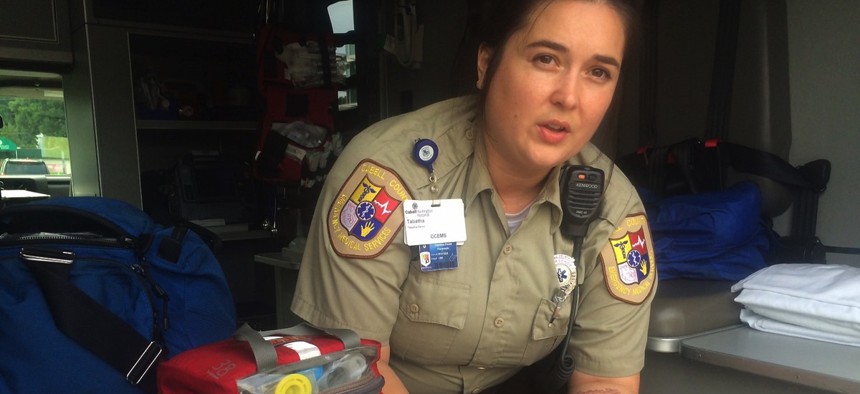A Horrifying Statistic That Conveys the Sheer Scale of the Opioid Crisis

Cabell County EMT Tabitha Perez demonstrates how medics administer naloxone to overdosing patients, in Huntington, W.Va. (AP Photo/Claire Galofaro)

Connecting state and local government leaders
In West Virginia, officials had to spend nearly $1 million on the transportation of corpses this fiscal year alone.
The opioid crisis in the United States is killing nearly one hundred people per day. Some areas are particularly hard hit, leaving officials to deal with constantly multiplying bodies of those claimed by overdose. In Ohio, morgues keep running out of space, forcing authorities to use temporary cold-storage trailers instead. In New Hampshire, medical examiners can’t handle the influx of bodies, making them unable to perform routine autopsies.
Add to that a new, terribly sad number: in West Virginia, officials had to spend nearly $1 million on the transportation of corpses in the fiscal year that ended June 30.
Authorities told the Charleston-Gazette Mail that the number of body transports nearly doubled from 2015 to 2017, with a record 880 people dying in the state of overdose last year—the highest rate in the US. One embalmer had to come out of retirement three years ago to help deal with the amount of bodies.
Each death requires at least two trips—to the morgue and to the funeral home. With only two state-run morgues, long trips become costly. West Virginia lawmakers had to approve an additional $500,000 in funding to transport the dead this year. With body transport becoming such a big business—$881,620 paid to private contractors in fiscal year 2017—some improprieties emerged as well. A company that at one point controlled 94% of the state’s business has recently been suspended for a potential and alleged breach of confidentiality, the Charleston Gazette-Mail reported.
The opioid crisis has reached such dire proportions in the US that a recent analysis published in the Journal of the American Medical Association said it cut the life expectancy in the US by 2.5 months. The total estimates of the epidemic’s cost to the economy vary, from $25 billion to even $150 billion a year, when you consider the cost of a lost life (paywall).
The Trump administration promised to take on the issue, with the president himself saying it was a “national emergency,” but no concrete steps have been made yet—including a formal declaration that the epidemic is a national emergency, which would unlock resources that could help.
Hanna Kozlowska is a criminal justice reporter for Quartz, where this article was originally published.

NEXT STORY: Election Hacks: Sorting Fact from Fiction




